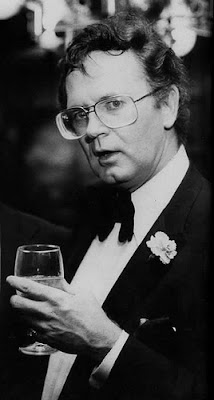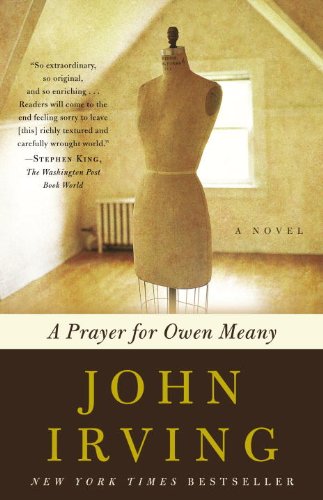Thankfully, time heals wounds of this sort pretty efficiently, so when I peeked into the one volume I hadn't read yet a few weeks ago I was happy to discover that my appetite for intimate conversations with working writers had returned. It's funny how the same words can be exasperating one day and inspiring the next...
The following are anecdotes, insights, self-recriminations and new lingo taken from Backstory 4: Interviews with Screenwriters of the 1970s and 1980s.
ROBERT BENTON
p. 29 "The banalities of married life are, for me, far more interesting and more poignant than the intensity of romance. There's something I find deeply moving about ordinary life."
re: his script for NADINE (1987)
p. 35 "There are two models (of screenplay structure). In one, plot grows out of character. This is the (Howard) Hawks model. In the other, character grows out of plot. This is the [Otto] Preminger model. When I do the architecture on a script of my own, I follow the Hawks approach. I do it so that characters become more complex, and they don't tell you where they're going until they get there."
LARRY COHEN
(Cohen's script for PHONE BOOTH, ultimately made in 2002 with Joel Schumacher at the helm, was once considered by Alfred Hitchcock.)
p. 77 "(Hitchcock) seemed very, very intimidated by Lew Wasserman and the Universal executives, who had more or less undermined his confidence in himself. While making him a very rich man, they'd also destroyed him as an artist. Hitch had severed his ties with [composer] Bernard Herrmann, for example, who had been a close friend and great collaborator, and mainly it was the Universal executives who poisoned his mind against Herrmann and convinced him he needed somebody like Henry Mancini to write songs and a hipper musical score. Which he never got, by the way."
BLAKE EDWARDS
p. 91 tsuris: |ˈtsoŏris; ˈtsər| noun, informal
trouble or woe; aggravation.
ORIGIN early 20th cent.: from Hebrew.
p. 95 "Therefore I consider that slapstick–literally slapstick–is not entirely what I do. Only some of it turns out to be slapstick. Slapstick comes from vaudeville–it comes from what they called "the slap stick" (slapping sound as he demonstrates), which made that sound."
WALTER HILL
p. 106 roustabout: noun
an unskilled or casual laborer.
• a laborer on an oil rig.
• a dock laborer or deckhand.
• a circus laborer.
ORIGIN mid 19th cent.: from the verb roust
"All of this taught me one important thing that carried over to writing. If you are capable of making a living out of your talent and imagination, you are a privileged soul. As to the actual writing, you learn about writing by reading. And then you learn to make use of your own particular attitudes, gifts, and skills by–writing, writing, writing."
p. 113 "I don't pretend to be a scholar about the history and evolution of screenwriting, and I think you have to approach it as a craft rather than an art. But it's the old story; if the craft gets good enough, it is an art."
p. 116 "My clearest impression is that (Michael) Eisner wanted movies to be a kind of pleasantly flavored chewing gum and was almost physically uncomfortable in dealing with anything about the dark side of the human heart."
p. 122 (re ALIEN) "I named her "Ripley" (after "Believe It or Not"); later, when she had to have a first name for ID cards, I added "Ellen" (my mother's middle name). I called the ship Nostromo (from Conrad: no particular metaphoric idea, I just thought it sounded good). Some of the characters are named after athletes: Brett was for George Brett, Parker was for Dave Parker of the Pirates, and Lambert was Jack Lambert of the Steelers."
p. 128 "My favorite description of the dilemma of screenwriting comes from David Giler, "Your work is only read by the people who will destroy it."
RUTH PRAWER JHABVALA
p. 151 "What I do realize is that I mustn't have a single word that's not absolutely necessary, no "Oh yes, I see," nothing like that. You have to compress and compress and just give them the essence."
LAWRENCE KASDAN
p. 170 "That's what the STAR WARS saga is about–it's about following those things which are strongest in you and imposing them on the world. Making a career in Hollywood is like that if you want to do your own work. If you want to do what they want you to do, it's easy. You just say yes. But if you want to do what you want to do, you're constantly manipulating the chaos of the system."
p. 176 "That's what all great tragedies are about for me–that in this adherence to a single idea, we sometimes sacrifice everything."
re: his script for BODY HEAT (1981)
ELMORE LEONARD
p. 217 "What's amazing to me when I think about it, is that while Hollywood in general prefers plot-driven stories (they ask, "What's it about?"), thirty-three of my thirty-five books, all character-driven and talky, have either been optioned or bought outright for film."
PAUL MAZURSKY
p. 229 "I'm very sympathetic to those characters. I feel that the middle class is not treated in terms of tragedy. You have to be very rich or very poor to be thought of as a tragic figure."
JOHN MILIUS
p. 296 colloquy: |ˈkäləkwē| noun ( pl. -quies)
1 formal: a conversation : they broke off their colloquy at once | an evening of sophisticated colloquy. See note at conversation .
2 a gathering for discussion of theological questions.
ORIGIN late Middle English : from Latin colloquium ‘conversation.’
p. 299
PM: Was Robert Shaw really as drunk as they say, shooting the scene?
JM: He was totally drunk.
(Shaw had just been busted screwing the nanny by his wife, and kept interjecting his drunken thoughts about the situation into the Indianapolis scene from JAWS, a scene that Milius wrote as a favor to Spielberg. What we see in the final product, of course, has all the nanny bits cut out.)
FREDERIC RAPHAEL
p. 328 (this next bit speaks to questions I had after viewing TWO FOR THE ROAD (1967), written by Raphael)
PM: What was the genesis of the film you did make next, TWO FOR THE ROAD?
FR: (My wife and I) used always to just pack up and travel together. While we were driving down to the south of France from London on one of these trips, I said, "Imagine if we met ourselves as we were ten years ago," and of course the idea revealed itself as a movie.
p. 381 confrere: noun
a fellow member of a profession; a colleague : executives from the four broadcast television networks, along with their cable confreres.
ORIGIN mid 18th cent. : French, from medieval Latin confrater, from con- ‘together with’ + frater ‘brother.’
"The difference between a movie and a novel is that a movie is just the surface of things, and the meanings and emotions can only be implicit."







































